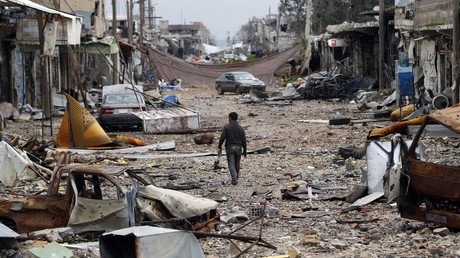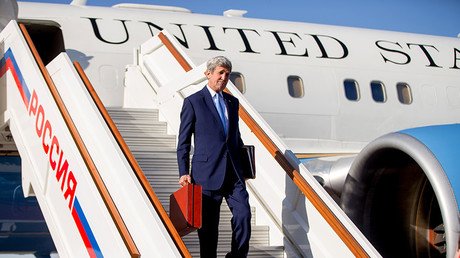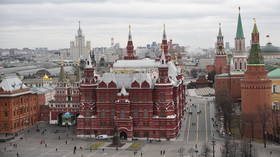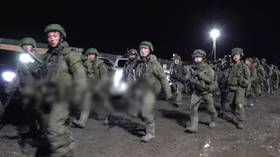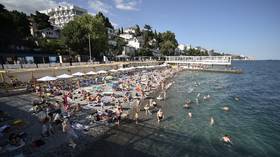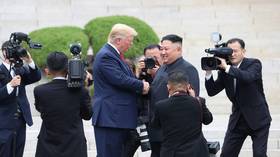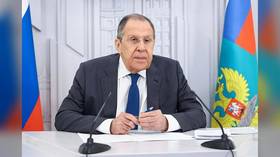‘US-supported Arab Spring created power vacuum across Middle East’

A reality check is behind the change in US rhetoric regarding the Middle East, says former CIA officer Philip Giraldi. He adds that the US was overly optimistic about the democratic transformation in the Middle East.
The head of the CIA, John Brennan, during his speech at the Brookings Institution admitted that the Arab Spring uprisings five years ago created fertile ground for terrorists. He added that the CIA predicted the outcome of the Arab Spring protests completely wrong in 2011, suggesting that terrorist groups like Al-Qaeda and ISIS would become weaker.
RT: Washington was very supportive of the Arab Spring at the time, calling it a process of democratic reform. What is behind this change of rhetoric do you think?
Philip Giraldi: Reality is behind this change of rhetoric. I think the US government, for reasons of its own, was overly optimistic about what it was seeing occur in the Middle East. Any kind of objective observer would have agreed that the breakdown of many of these governments into a more democratic form - where many groups were vying for power - would create a power vacuum. In the power vacuum, naturally, the militant groups are able to insert themselves.
RT: How much of an influence did the US actually have on the wave of uprisings in Tunisia, Egypt, etc? Do you think those revolutions were simply inevitable, with or without support from Washington?
PG: Well, I think Washington was certainly pushing, but in the case of Egypt they were probably reluctant. They were certainly reluctant to destabilize the situation, because Egypt is a major player in the Middle East. There was a lot of ambivalence about what was going on, and a lot of misunderstanding about where this would wind up… like in Iraq and Syria there would be a power vacuum, and the consequences would not be very good.
RT: How do you think, Saudi Arabia, being one of the US’ closest allies, will react to Brennan's remarks, and how could it affect Washington's relationship with the country?
PG: The problem with Saudi Arabia is that the Saudi government, the Saudi kingdom, is essentially reliant on the support of what we considered to be extremist religious types. As a result they’ve become an asset of the government. The government has promoted their activity for well over 30 years. The problem is once you have these fundamentalist types in place in all these countries, they provide an infrastructure for other extremists that perhaps are more in the line of terrorists to exploit that infrastructure and make trouble.
RT: In light of Brennan's comments. Do you expect to see any change in US policy in the Mideast?
PG: That is difficult to say. The US is very reluctant ever to admit that it has made any errors. That is part of the problem. There has been a misreading of what has been occurring in the Middle East for quite some time now. To suddenly shift direction will be very difficult. I expect that realists within the administration, if there are any, are arguing that we have to be more pragmatic about how we deal with countries like Saudi Arabia and Turkey.
Kerry’s visit to Moscow: attempt to calm situation
Gregory Copley, Editor, Defense & Foreign Affairs Publications told RT that John Kerry might be trying to wind down the Syrian war and “help Turkey rebuild relations with Damascus, and basically save the unity of Turkey.”
The US Secretary of State arrives in Moscow on Thursday, for talks that are expected to find common ground on Syria.
RT: What do you think is the game plan here, for the US? What will John Kerry be hoping to achieve at these talks in Moscow?
Gregory Copley: I think he has been trying to calm the situation in order to get Turkey off the hook. Turkey finds itself under severe strategic stress. It wished to destabilize Syria. It is prepared to throw some of the former proxy groups to the wolves. There is no question that Kerry is pushing President Erdogan to at least nominally in the conflict with Syria possibly leaving President Assad in place, while Turkey tries to fight its own civil war and takes the war on the northern front against Russia through Ukraine and the like. That is not anything nice that Secretary Kerry is doing for Russia. He is doing this deliberately to start to wind down the Syrian war, in my opinion and to help Turkey rebuild relations with Damascus and basically save the unity of Turkey.
RT: However, we’ve seen Turkey normalize relations with Russia. The suggestion has been that they have taken the lead and it forced the US to follow. What’s your take on that?
GC: Well, I think the US knows that it is a no-win situation in Syria, and also knows that Turkey is in the midst of a severe civil war and that Turkey’s conflict, Cold War, if you want, with Russia is not helping that situation. Basically, Turkey has to do several things. It has to make peace with Russia, make peace with Israel, get its economy back in shape, and then try to deal with the war, which bounced back out of Syria, namely the Kurds and now its Syrian and possibly Russian backing, fighting a civil war inside Turkey. Turkey’s got its back to the wall; its economy is collapsing. It has to withdraw some of its support for these groups. The question is, whether Saudi Arabia will go along with the US basically throwing Jabhat al-Nusra and Jaysh al-Islam, for example, to the wolves. But it probably doesn’t have a lot of choice. Both Turkey and Saudi Arabia have recognized that the jihadist groups they have set as proxy forces in Syria and Iraq have now moved out of their control. So maybe they are very happy to call it quits in Syria.
The statements, views and opinions expressed in this column are solely those of the author and do not necessarily represent those of RT.
